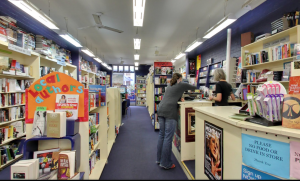As we cover ground in the ETL503 (Resourcing the Curriculum) modules on such topics as the importance of applying for budget funding (Debowski, 2001) through to issues of collection management (Kenny, 2006), I find myself reflecting on some of the realities of systems that have developed over many years, and that I have inherited in my new school library.

Bray’s Books, Balmain
The issue of relationship with book suppliers is very important to me and how I manage the collection development role in my school’s library. Our school has a relationship of long-standing with a local, family-owned and run, bookshop… and I have come to realise the enormous benefits of having this type of connection to experts in the field of Young Adult book supply.
My initial questions, about whether to maintain this relationship, were to do with whether this arrangement would be cost effective – but those fears have certainly been allayed as I have done the research and verified that their prices are certainly competitive to other supply options. Once those concerns were put aside, the many benefits of having this connection have been revealed.
Firstly, the length of the relationship means that the staff of this bookshop know a great deal about the library collection of my school. They know the mix of genres that have been favoured over the years, and have a good understanding of the patterns of readers that have gone through the school. They know which series we are following and can be an invaluable source of information for notification of new additions to popular Young Adult fiction series, and new genre choices. They can help with the challenges of matching book to reader.
However, the outstanding benefit of this arrangement – the one that I wasn’t really prepared for and am most fortunate to be able to step into – is the community connection made available through using this supplier, and the immediate sense of relationship over a common interest and focus… that together we are building the School library collection in order to focus on the needs of the students at my school. This realisation harks back to another time – it even brings to mind one of my favourite books, 84, Charing Cross Road by Helene Hanff – when expertise in managing bookstores was respected and supporting local businesses was seen as important for all the right reasons.
So I will be counting myself as fortunate and looking forward to developing this connection between our library and our bookshop… for as long as is possible. It’s wonderful to be able to enjoy this dimension to the challenge of Collection Development and Management at our school.
Deb Hogg
Debowski, S. (2001). Collection management policies. In K. Dillon, J. Henri & J. McGregor (Eds.). Providing more with less: collection management for school libraries (2nd ed.). (pp.126-136). Wagga Wagga, NSW: Centre for Information Studies, Charles Sturt University.
Kennedy, J. (2006). Collection management : A concise introduction. (Rev.ed.). Wagga Wagga, N.S.W. : Centre for Information Studies, Charles Sturt University.
